Otterbein 'philosophy of death' class gets students out of the classroom, into the cemetery
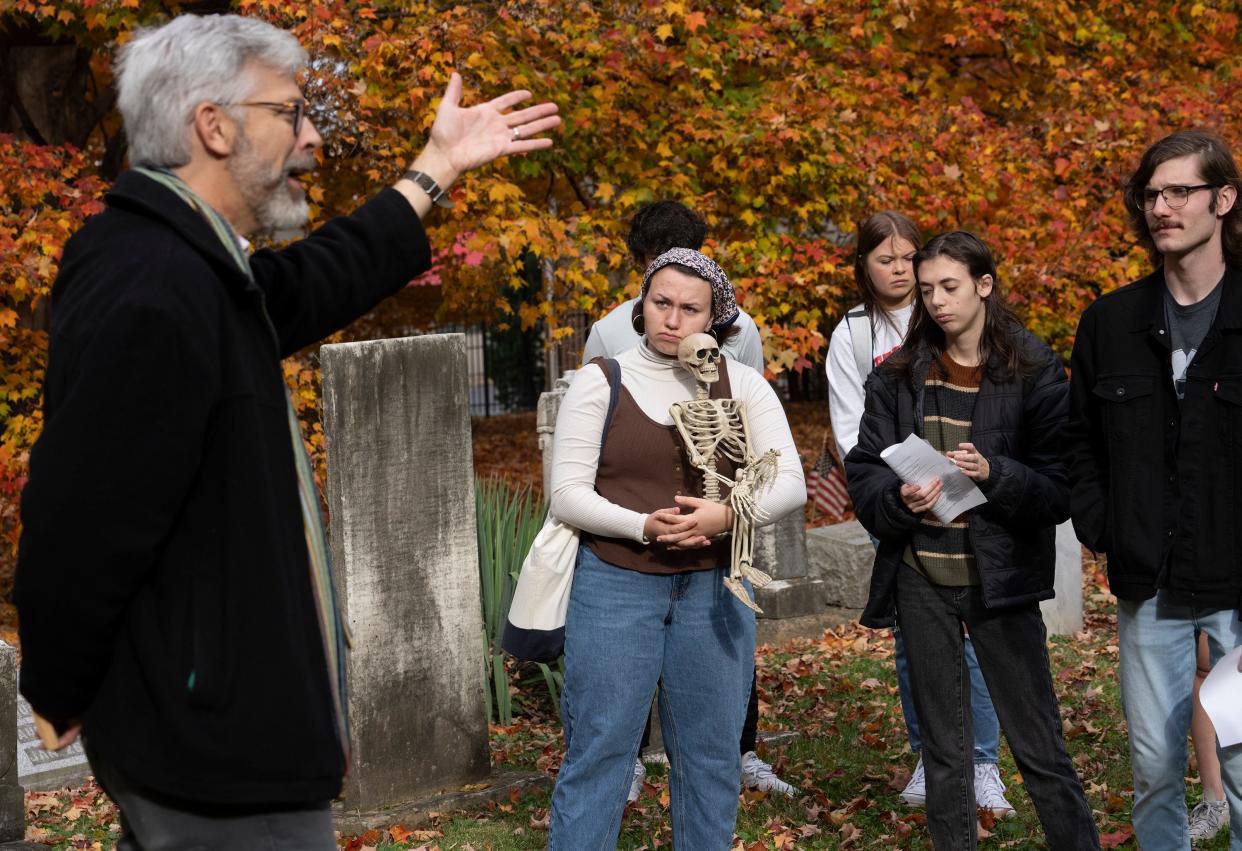
Think on Death. It is a wonderful thing to learn thoroughly how to die.
The quote, attributed to the ancient philosopher Seneca, was printed at the bottom of a handout that Andrew Mills recently provided to his Introduction to Philosophy students.
But chances are Seneca would've hated where Mills, an Otterbein University philosophy professor, held class last Wednesday: on the lawn of Olde Methodist Cemetery in Westerville.
The nearly 200-year-old cemetery is located on a small plot of land within eyeshot of Otterbein's Memorial Stadium. Bright orange leaves popped against the overcast sky and aging headstones. The unseasonably warm weather and light breeze made it the perfect day for a class field trip.
Still, Seneca probably would not have approved. A Stoic philosopher like him likely would argue visiting the dead is like picking at a scab. Why drudge up unpleasant emotions when you could live in tranquility?
Other philosophers though, such as the more modern Michael Cholbi, would disagree. A cemetery visit might inspire thoughts of self-knowledge, Cholbi might argue, a chance to better understand our values and concerns.
"If you don't grieve, you miss out on the opportunity to have those hard thoughts," Mills told his class.
It's conversations like this, Mills said, that makes the topic of death an excellent theme for his Introduction to Philosophy course.
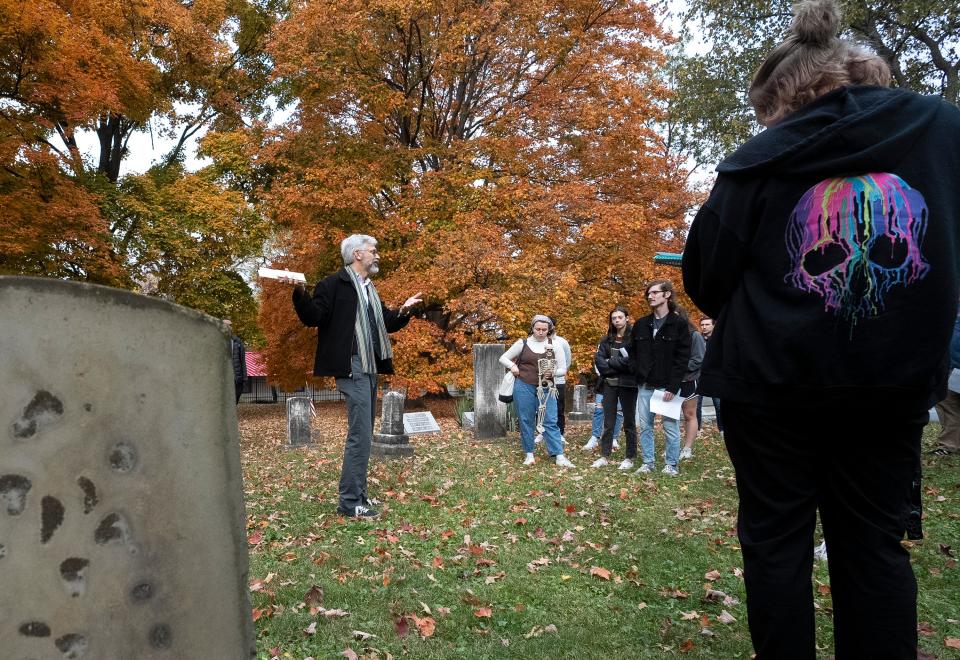
Mills, who has taught at Otterbein since 1999, has taught philosophy courses on topics such as happiness, logic and existentialism. But for the past five years, Mills has focused his introductory course on the philosophy of death. His students read about and discuss topics like grief, memory, mortality, afterlife and burials.
"Death is an issue all of us deal with in one way or another. We want to talk about it," he said. "Death turned out to be a topic students really resonate with."
In addition to classroom discussions on philosophical questions (Is there a mortal soul? Can we outlive our own death?), a cemetery visit is a staple of the course.
Mills took inspiration from American naturalist and philosopher Henry David Thoreau, who believed walking outdoors was more valuable in contemplating life’s big questions than sitting inside. He also got the idea from a friend who would take "philosophical gallery walks" around a neighborhood, observe the surroundings and ask questions. A cemetery, he said, was the perfect locale for his class.
"It's a way into thinking about some of these questions about grieving, memory legacy, and how we live knowing we'll die," Mills said.
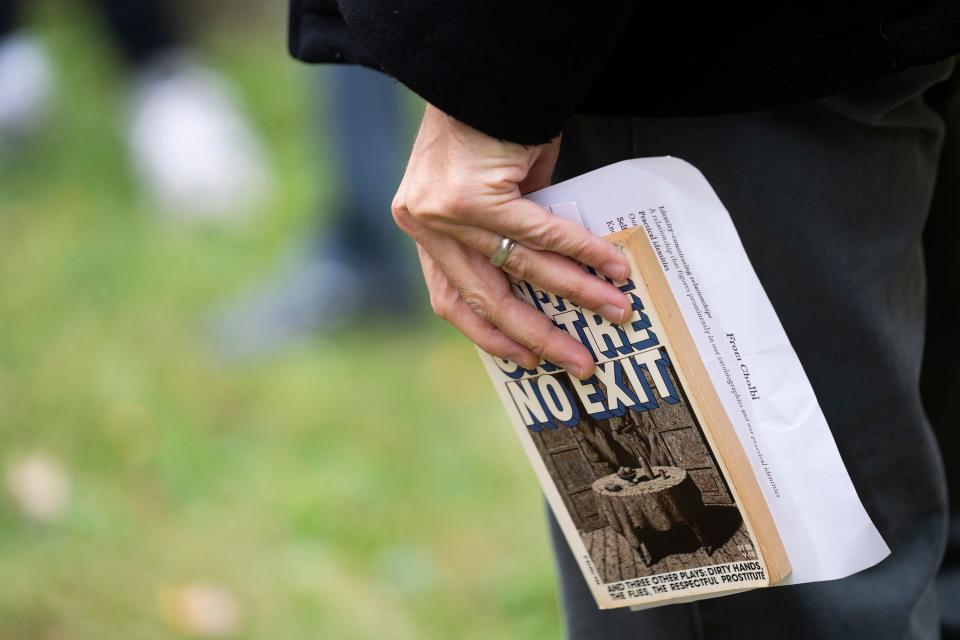
In earlier iterations of his class, students would visit multiple cemeteries during the semester. There were trips to the historic Green Lawn Cemetery on the West Side and Kokosing Nature Preserve in Gambier, a conservation burial ground located on a 23-acre former golf course.
The pandemic made those trips harder to coordinate, so now Mills offers extra credit for cemetery visits. But a trip to Olde Methodist Cemetery still has a place on the syllabus.
"I wanted to put them in a place they might feel uncomfortable or not spend a lot of time," Mills said.
Uncomfortable was how some students felt before class last week. As they stood at the cemetery entrance, Mills asked his class of about 20 students if they've ever visited this cemetery before.
"I get very... I don't like to disrespect the dead, so this feels off," Jenna Davies, a senior studying theater design and technology, shared with her peers.
Julia Murphy, a senior musical theater major, said she'd visited the cemetery before for another class. This time though, she brought along Skelly, a plastic skeleton used as a promo for the university's recent production of "Everybody", a modern adaptation of the 15th-century morality play "Everyman".
It was only fitting then that Skelly would tag along to the cemetery.
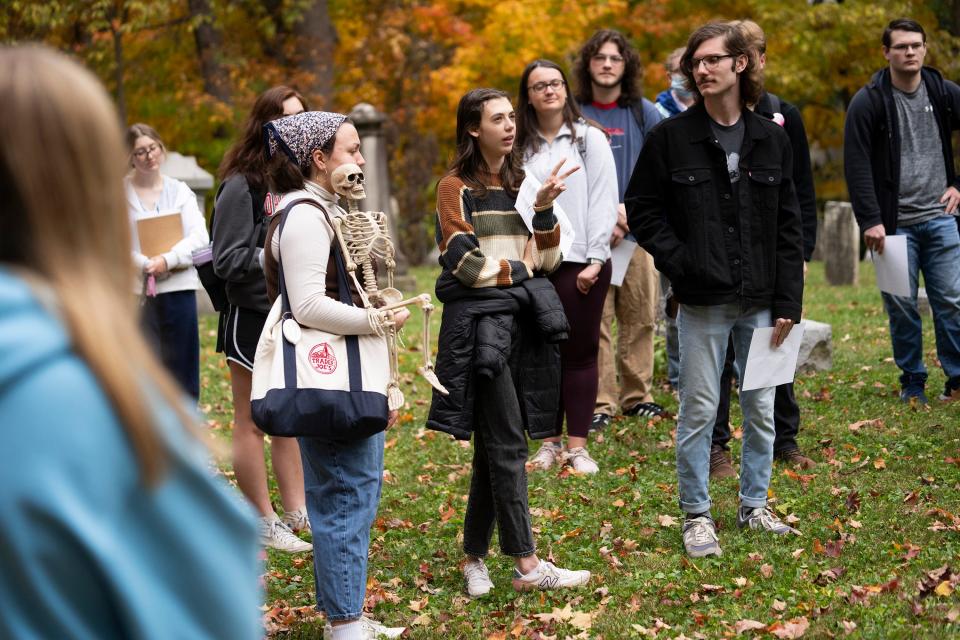
Students walked about the cemetery for about 10 minutes, looking at headstones and considering the questions on Mills' handout. Then they all gathered in the middle of the cemetery to discuss more.
Some students said they felt the urge to clean the decaying headstones, prompting a dialogue about what an unkempt cemetery communicates about respect. Others noted how the material of and engravings on the headstones made them think about how class and wealth can be clear even after death.
Mills shared that he often thinks about the idea of memory in the graveyard, especially when looking at graves so worn that the occupant's name isn't clear. He asks himself, "What happens to memory when no one knows who it is?"
Murphy said Mills' class and walking around cemetery "gets a little meta at times" (all the more so with Skelly in her arms). It's been comforting, she said, to grapple with questions about death in class.
"We are just bodies, but what is the mind and what is the soul?" Murphy asked. "What makes a person a person?"
Gabe Whitlock, a senior theater design and technology major, said the class "pulls back the curtain" on the topic of death.
"We have a whole industry in America designed to make us not think about death," he said. "The tendency is to not talk about it, but here we are forced to. It's good to talk about it."
Mills said the majority of his students are not philosophy majors, which has its perks. It's a chance for him to teach all students that general philosophy can be useful and applicable, not just something abstract.
The class has also been surprisingly insightful for Mills and many of his students.
Mills' father died the first year he taught the course. The following year, Otterbein football player Nigel Chatman died in a car crash. Students have lost grandparents, parents, friends and even pets. They've witnessed school shootings and unimaginable loss, Mills said.
"They're college students. They think they're invincible. But they're also thinking about grief," he said.
Mills said it's been heartening to see students apply the class material to their own lives during trying times. Just last week, a former student emailed Mills to thank him for the comfort remembering class discussions on grief brought him in the wake of his pet's death.
"The point of the class is not group therapy, but I hadn't realized just how much people would connect with it," Mills said. "I'm not a therapist, but here's an idea that might help you think about your own grief."
There is something valuable in philosophy, here for you, Mills said.
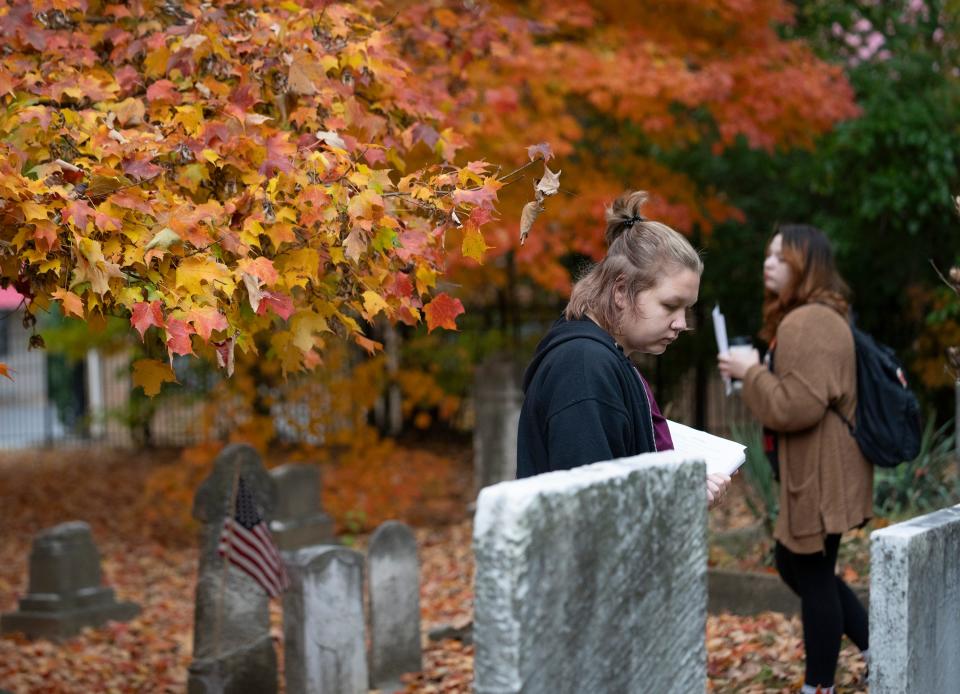
Sheridan Hendrix is a higher education reporter for The Columbus Dispatch. Sign up for Extra Credit, her education newsletter, here.
shendrix@dispatch.com
@sheridan120
This article originally appeared on The Columbus Dispatch: Otterbein 'philosophy of death' class uses cemeteries as teaching tool

